https://woodyguthriecenter.
~~ recommended by emil karpo ~~
Woody’s message continues to change the world as he inspires a new generation of artists and activists to take a stand. Without contemporary forms of communication, the bards brought stories to people. That’s what Woody did.
He spoke up for the Dust Bowl migrants, bringing attention to their plight in a way that the listeners to his radio show, The Woody and Lefty Lou Show, were able to understand. He traveled with his African American friends and fellow musicians, breaking a color barrier during a time when that wasn’t readily acceptable. Woody was fearless and always ready to fight for those who needed help.
Woody’s empathy allowed him to insert himself into the stories of others, and he shared those narratives through music, prose, and artwork. He often wrote “I ain’t dead yet.” We feel his presence and see his influence when people everywhere speak out for those who need a voice and shine a light on injustice in our world.
WOODY GUTHRIE’S EARLY LIFE
Named after President Woodrow Wilson, Woody was born on July 14, 1912, in Okemah, Oklahoma. Okemah was one of the first oil boom towns and was bursting with activity at the time of his birth. Okemah is in the heart of the Muscogee-Creek Nation, and near Boley, one of Oklahoma’s largest and most prosperous Black towns.
Although Okemah was a vibrant, bustling, and diverse city, that diversity did not mean equality for all members of the community. Woody did not emerge from the earth an enlightened human being; rather, he grew up in an era and in a region that actively promoted the mistreatment of non-Whites. Okemah was a “Sundown town” — a term that came from signs posted that people of color had to leave town by sundown — near an area called “Little Dixie.” His father was likely a member of the Ku Klux Klan, and young Woody absorbed the sounds of prejudice as well as the culturally diverse sounds around him.
At the Woody Guthrie Center, we share these truths about his background to show the potential we all have for change. As Woody traveled and broadened his world view, he turned away from those racist ideas and became one of our first and most vocal advocates for civil rights. His writings in the early 1940s and ’50s are enlightened, powerful messages of equality and could have easily been written by activists during the American civil rights movement.
TRAGEDY BY FIRE
Fires were a constant issue in Woody’s life. When he was 6, his older sister, Clara, died from burns suffered in a house fire. Several years later, his father, Charlie, was seriously injured in another house fire. As a result, Woody’s father moved to Pampa, Texas, to be nursed back to health in his brother’s home, while Woody’s mother, Nora, was committed to a mental institution due to her battle with Huntington’s disease.
Fire also plagued Woody in his adult life. Cathy, his first daughter from his second marriage, was burned in an apartment fire when she was 4 and died from her injuries. When Huntington’s disease started affecting Woody himself, he suffered severe burns to his arm.
IN WOODY’S WORDS
WOODY GUTHRIE AND THE DUST BOWL
Woody was in Pampa, Texas, when the worst of the Dust Bowl storms hit the Panhandle town, causing people to think the world was ending. The commotion inspired Woody to write “So Long, It’s Been Good to Know Yuh,” mixing the tragedy of the event with the irony of a greedy preacher ready to take up a collection from those who were fearful. As he saw more and more people leaving the Plains states for California, Woody’s innate curiosity made him anxious to hit the road and see what was happening in the promised “Garden of Eden” on the West Coast.
Visitors to the Woody Guthrie Center can learn more about the era and its effect on Woody through our Dust Bowl virtual reality experience.
WOODY GUTHRIE’S MIGRATION TO CALIFORNIA
Woody’s cousin Jack Guthrie lived in Los Angeles, and the two formed a radio show partnership in 1937. That show was short-lived, and when Jack left the show, Woody became radio partners with their friend Maxine (Lefty Lou) Crissman.
The Woody and Lefty Lou Show was an almost immediate success, and the duo began receiving hundreds of fan letters. Woody knew that his voice was reaching the listening audience and that he could use that connection to speak for his people — the migrants who were simply looking for a good job to allow them to feed their families.
WAS WOODY GUTHRIE A COMMUNIST?
Woody was never a member of any political party. His views weren’t a political ideology; rather, they were a humanist perspective. In his own words, “Left wing, right wing, chicken wing, it don’t make no difference to me.” Instead of a communist, Woody thought of himself as a “commonist,” fighting for the common people.
Known for his opposition to fascism, in the early 1940s Woody painted the now-famous phrase “this machine kills fascists” on his guitar, consequently inspiring many artists who came after him. He continued writing the phrase on his guitars after the end of World War II, because he still felt the threat from fascists who would oppress the rights of the people.
WOODY GUTHRIE’S CAREER
Woody never “made it big” during his lifetime. His goal wasn’t personal wealth but to remain true to his ideals and work for the people. He walked away from many good jobs because someone in the corporate hierarchy tried to control what he said.
Woody sang the songs and said the things that needed to be said, and those things didn’t always work for a company’s idea of commercial success.


No comments:
Post a Comment